Teaching Philosophy Based on EYLF
VerifiedAdded on 2023/06/09
|5
|1069
|345
AI Summary
This article discusses the teaching philosophy based on EYLF and its impact on the learning process of young children. It covers the principles of the framework, theories of early childhood, desired outcomes, implementation in early childhood settings, and the concepts of belonging, being, and becoming. References are also provided.
Contribute Materials
Your contribution can guide someone’s learning journey. Share your
documents today.
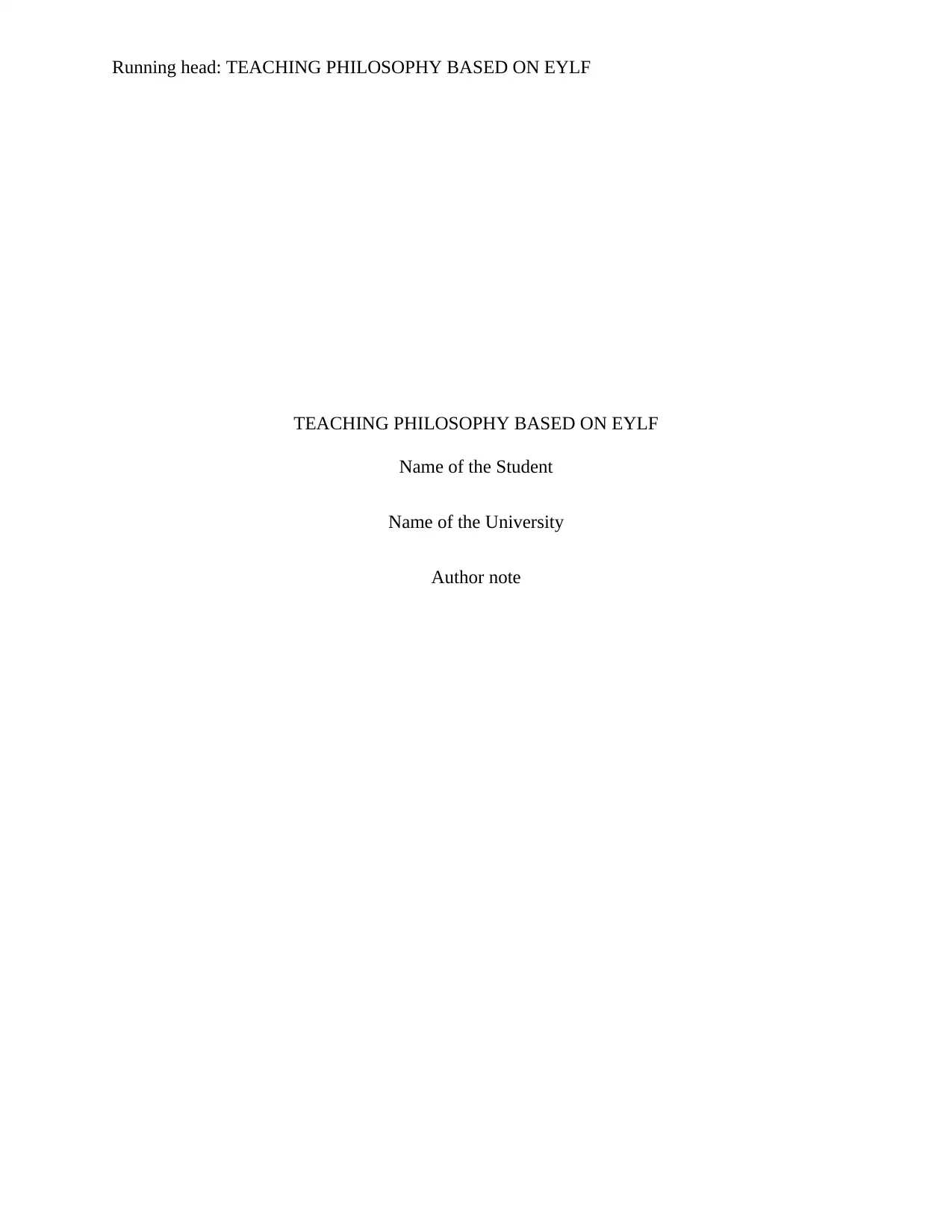
Running head: TEACHING PHILOSOPHY BASED ON EYLF
TEACHING PHILOSOPHY BASED ON EYLF
Name of the Student
Name of the University
Author note
TEACHING PHILOSOPHY BASED ON EYLF
Name of the Student
Name of the University
Author note
Secure Best Marks with AI Grader
Need help grading? Try our AI Grader for instant feedback on your assignments.
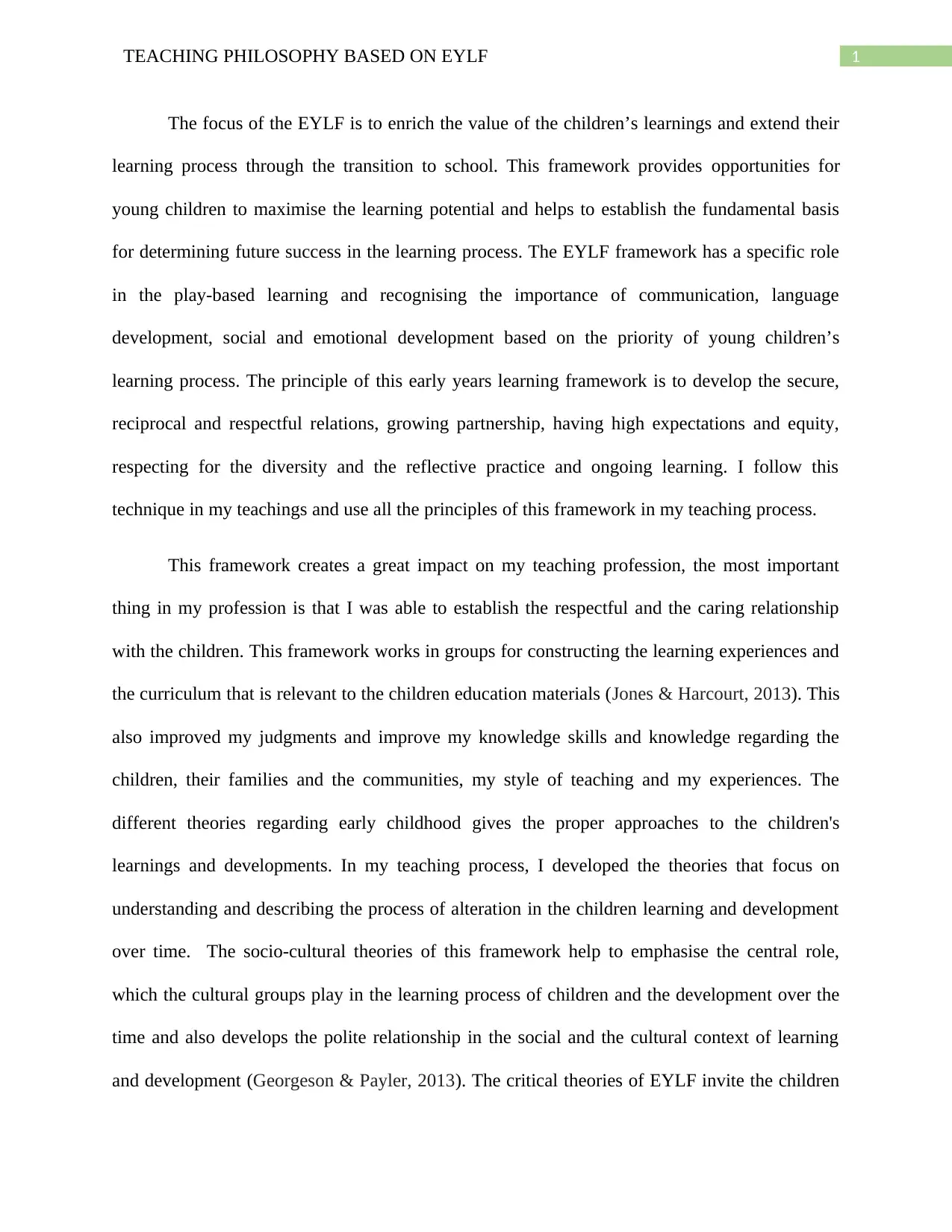
1TEACHING PHILOSOPHY BASED ON EYLF
The focus of the EYLF is to enrich the value of the children’s learnings and extend their
learning process through the transition to school. This framework provides opportunities for
young children to maximise the learning potential and helps to establish the fundamental basis
for determining future success in the learning process. The EYLF framework has a specific role
in the play-based learning and recognising the importance of communication, language
development, social and emotional development based on the priority of young children’s
learning process. The principle of this early years learning framework is to develop the secure,
reciprocal and respectful relations, growing partnership, having high expectations and equity,
respecting for the diversity and the reflective practice and ongoing learning. I follow this
technique in my teachings and use all the principles of this framework in my teaching process.
This framework creates a great impact on my teaching profession, the most important
thing in my profession is that I was able to establish the respectful and the caring relationship
with the children. This framework works in groups for constructing the learning experiences and
the curriculum that is relevant to the children education materials (Jones & Harcourt, 2013). This
also improved my judgments and improve my knowledge skills and knowledge regarding the
children, their families and the communities, my style of teaching and my experiences. The
different theories regarding early childhood gives the proper approaches to the children's
learnings and developments. In my teaching process, I developed the theories that focus on
understanding and describing the process of alteration in the children learning and development
over time. The socio-cultural theories of this framework help to emphasise the central role,
which the cultural groups play in the learning process of children and the development over the
time and also develops the polite relationship in the social and the cultural context of learning
and development (Georgeson & Payler, 2013). The critical theories of EYLF invite the children
The focus of the EYLF is to enrich the value of the children’s learnings and extend their
learning process through the transition to school. This framework provides opportunities for
young children to maximise the learning potential and helps to establish the fundamental basis
for determining future success in the learning process. The EYLF framework has a specific role
in the play-based learning and recognising the importance of communication, language
development, social and emotional development based on the priority of young children’s
learning process. The principle of this early years learning framework is to develop the secure,
reciprocal and respectful relations, growing partnership, having high expectations and equity,
respecting for the diversity and the reflective practice and ongoing learning. I follow this
technique in my teachings and use all the principles of this framework in my teaching process.
This framework creates a great impact on my teaching profession, the most important
thing in my profession is that I was able to establish the respectful and the caring relationship
with the children. This framework works in groups for constructing the learning experiences and
the curriculum that is relevant to the children education materials (Jones & Harcourt, 2013). This
also improved my judgments and improve my knowledge skills and knowledge regarding the
children, their families and the communities, my style of teaching and my experiences. The
different theories regarding early childhood gives the proper approaches to the children's
learnings and developments. In my teaching process, I developed the theories that focus on
understanding and describing the process of alteration in the children learning and development
over time. The socio-cultural theories of this framework help to emphasise the central role,
which the cultural groups play in the learning process of children and the development over the
time and also develops the polite relationship in the social and the cultural context of learning
and development (Georgeson & Payler, 2013). The critical theories of EYLF invite the children
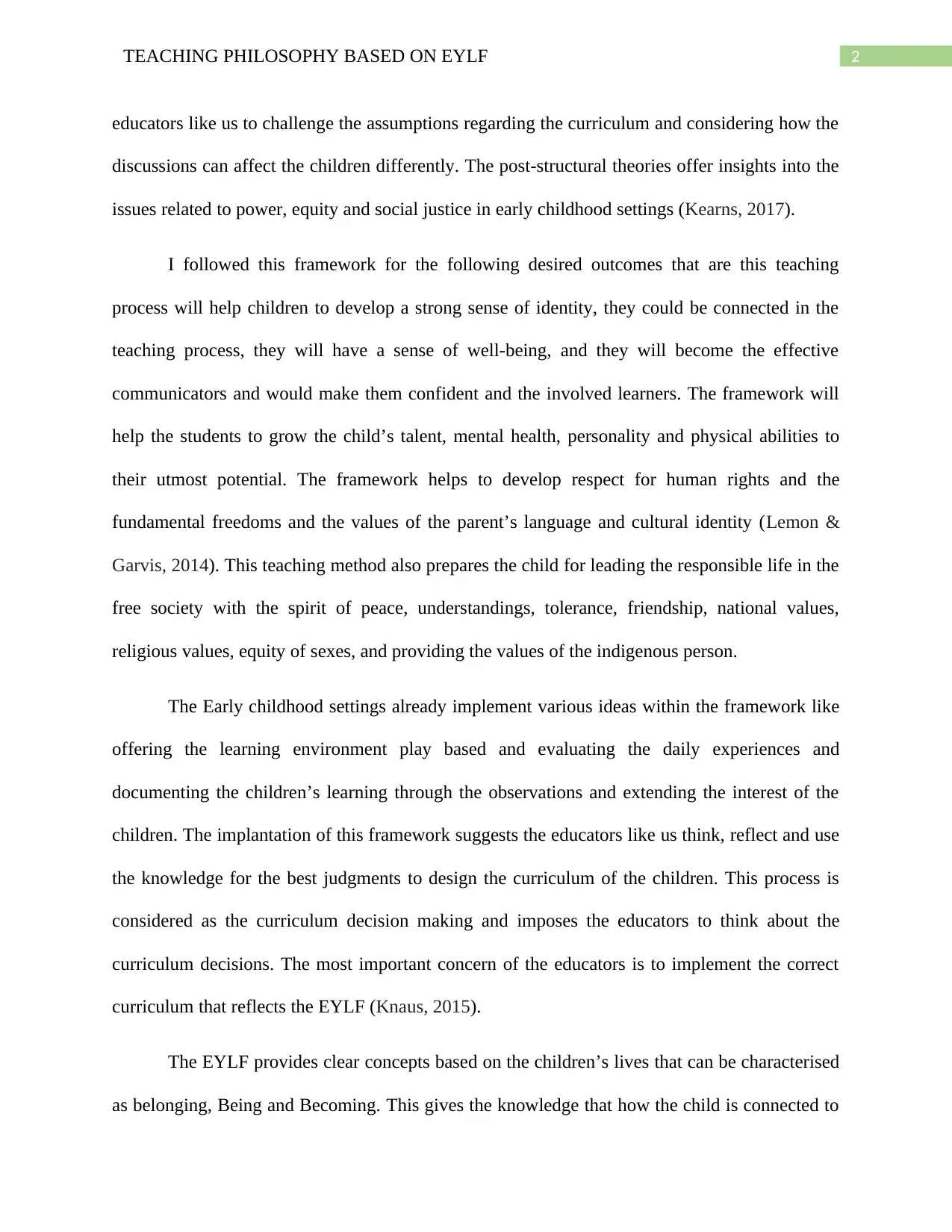
2TEACHING PHILOSOPHY BASED ON EYLF
educators like us to challenge the assumptions regarding the curriculum and considering how the
discussions can affect the children differently. The post-structural theories offer insights into the
issues related to power, equity and social justice in early childhood settings (Kearns, 2017).
I followed this framework for the following desired outcomes that are this teaching
process will help children to develop a strong sense of identity, they could be connected in the
teaching process, they will have a sense of well-being, and they will become the effective
communicators and would make them confident and the involved learners. The framework will
help the students to grow the child’s talent, mental health, personality and physical abilities to
their utmost potential. The framework helps to develop respect for human rights and the
fundamental freedoms and the values of the parent’s language and cultural identity (Lemon &
Garvis, 2014). This teaching method also prepares the child for leading the responsible life in the
free society with the spirit of peace, understandings, tolerance, friendship, national values,
religious values, equity of sexes, and providing the values of the indigenous person.
The Early childhood settings already implement various ideas within the framework like
offering the learning environment play based and evaluating the daily experiences and
documenting the children’s learning through the observations and extending the interest of the
children. The implantation of this framework suggests the educators like us think, reflect and use
the knowledge for the best judgments to design the curriculum of the children. This process is
considered as the curriculum decision making and imposes the educators to think about the
curriculum decisions. The most important concern of the educators is to implement the correct
curriculum that reflects the EYLF (Knaus, 2015).
The EYLF provides clear concepts based on the children’s lives that can be characterised
as belonging, Being and Becoming. This gives the knowledge that how the child is connected to
educators like us to challenge the assumptions regarding the curriculum and considering how the
discussions can affect the children differently. The post-structural theories offer insights into the
issues related to power, equity and social justice in early childhood settings (Kearns, 2017).
I followed this framework for the following desired outcomes that are this teaching
process will help children to develop a strong sense of identity, they could be connected in the
teaching process, they will have a sense of well-being, and they will become the effective
communicators and would make them confident and the involved learners. The framework will
help the students to grow the child’s talent, mental health, personality and physical abilities to
their utmost potential. The framework helps to develop respect for human rights and the
fundamental freedoms and the values of the parent’s language and cultural identity (Lemon &
Garvis, 2014). This teaching method also prepares the child for leading the responsible life in the
free society with the spirit of peace, understandings, tolerance, friendship, national values,
religious values, equity of sexes, and providing the values of the indigenous person.
The Early childhood settings already implement various ideas within the framework like
offering the learning environment play based and evaluating the daily experiences and
documenting the children’s learning through the observations and extending the interest of the
children. The implantation of this framework suggests the educators like us think, reflect and use
the knowledge for the best judgments to design the curriculum of the children. This process is
considered as the curriculum decision making and imposes the educators to think about the
curriculum decisions. The most important concern of the educators is to implement the correct
curriculum that reflects the EYLF (Knaus, 2015).
The EYLF provides clear concepts based on the children’s lives that can be characterised
as belonging, Being and Becoming. This gives the knowledge that how the child is connected to
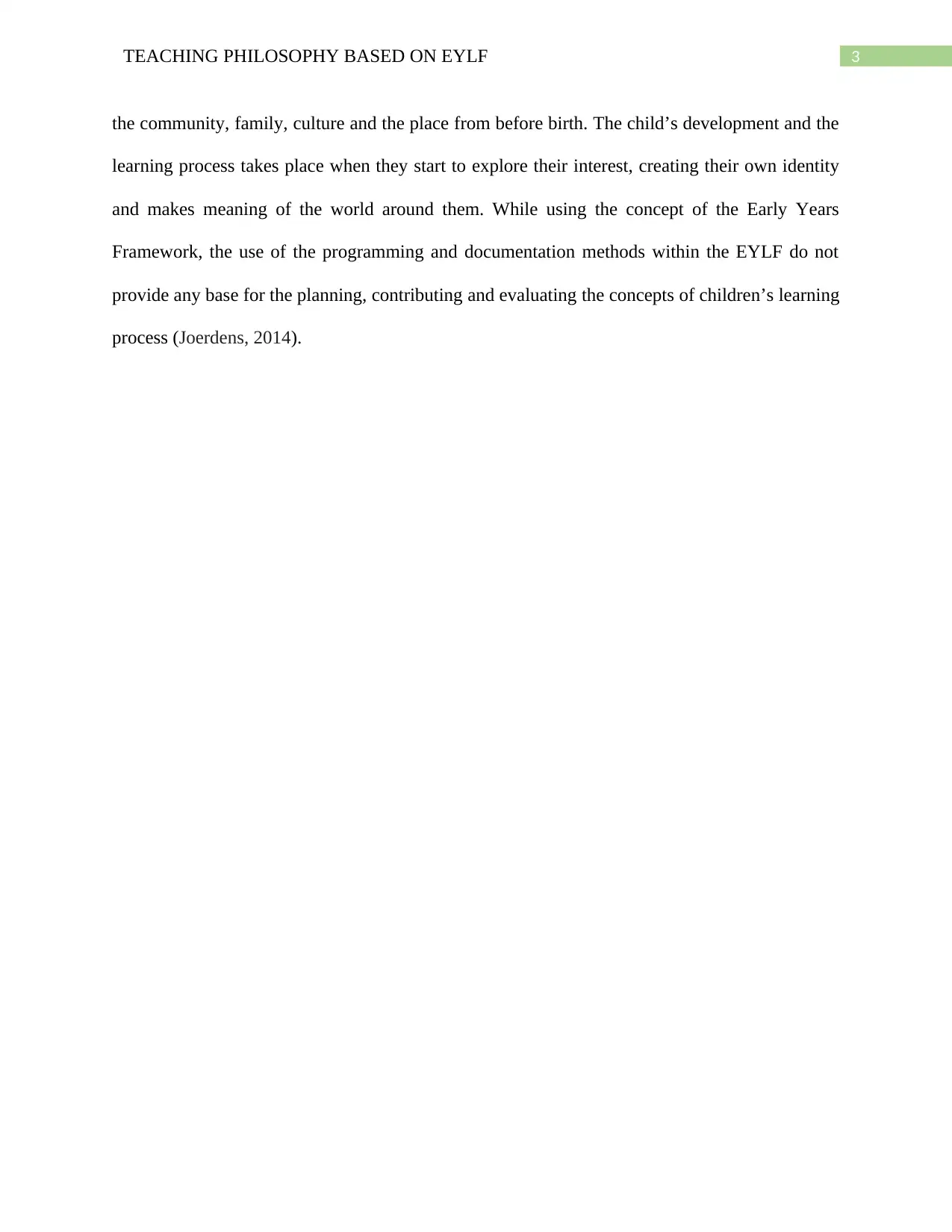
3TEACHING PHILOSOPHY BASED ON EYLF
the community, family, culture and the place from before birth. The child’s development and the
learning process takes place when they start to explore their interest, creating their own identity
and makes meaning of the world around them. While using the concept of the Early Years
Framework, the use of the programming and documentation methods within the EYLF do not
provide any base for the planning, contributing and evaluating the concepts of children’s learning
process (Joerdens, 2014).
the community, family, culture and the place from before birth. The child’s development and the
learning process takes place when they start to explore their interest, creating their own identity
and makes meaning of the world around them. While using the concept of the Early Years
Framework, the use of the programming and documentation methods within the EYLF do not
provide any base for the planning, contributing and evaluating the concepts of children’s learning
process (Joerdens, 2014).
Secure Best Marks with AI Grader
Need help grading? Try our AI Grader for instant feedback on your assignments.
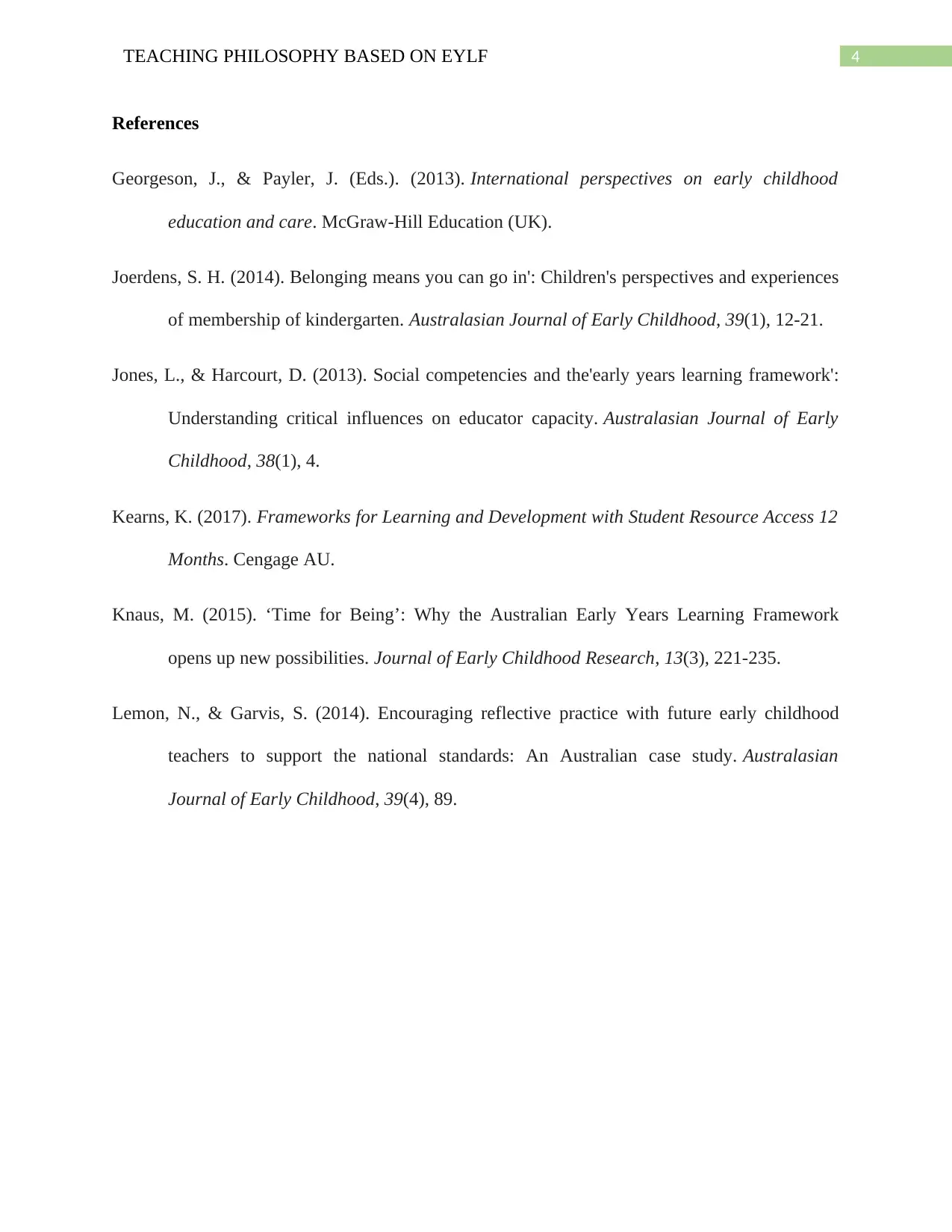
4TEACHING PHILOSOPHY BASED ON EYLF
References
Georgeson, J., & Payler, J. (Eds.). (2013). International perspectives on early childhood
education and care. McGraw-Hill Education (UK).
Joerdens, S. H. (2014). Belonging means you can go in': Children's perspectives and experiences
of membership of kindergarten. Australasian Journal of Early Childhood, 39(1), 12-21.
Jones, L., & Harcourt, D. (2013). Social competencies and the'early years learning framework':
Understanding critical influences on educator capacity. Australasian Journal of Early
Childhood, 38(1), 4.
Kearns, K. (2017). Frameworks for Learning and Development with Student Resource Access 12
Months. Cengage AU.
Knaus, M. (2015). ‘Time for Being’: Why the Australian Early Years Learning Framework
opens up new possibilities. Journal of Early Childhood Research, 13(3), 221-235.
Lemon, N., & Garvis, S. (2014). Encouraging reflective practice with future early childhood
teachers to support the national standards: An Australian case study. Australasian
Journal of Early Childhood, 39(4), 89.
References
Georgeson, J., & Payler, J. (Eds.). (2013). International perspectives on early childhood
education and care. McGraw-Hill Education (UK).
Joerdens, S. H. (2014). Belonging means you can go in': Children's perspectives and experiences
of membership of kindergarten. Australasian Journal of Early Childhood, 39(1), 12-21.
Jones, L., & Harcourt, D. (2013). Social competencies and the'early years learning framework':
Understanding critical influences on educator capacity. Australasian Journal of Early
Childhood, 38(1), 4.
Kearns, K. (2017). Frameworks for Learning and Development with Student Resource Access 12
Months. Cengage AU.
Knaus, M. (2015). ‘Time for Being’: Why the Australian Early Years Learning Framework
opens up new possibilities. Journal of Early Childhood Research, 13(3), 221-235.
Lemon, N., & Garvis, S. (2014). Encouraging reflective practice with future early childhood
teachers to support the national standards: An Australian case study. Australasian
Journal of Early Childhood, 39(4), 89.
1 out of 5
Related Documents
Your All-in-One AI-Powered Toolkit for Academic Success.
+13062052269
info@desklib.com
Available 24*7 on WhatsApp / Email
![[object Object]](/_next/static/media/star-bottom.7253800d.svg)
Unlock your academic potential
© 2024 | Zucol Services PVT LTD | All rights reserved.





